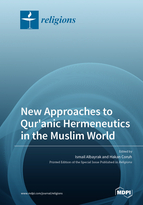New Approaches to Qur'anic Hermeneutics in the Muslim World
A special issue of Religions (ISSN 2077-1444). This special issue belongs to the section "Religions and Theologies".
Deadline for manuscript submissions: closed (31 July 2022) | Viewed by 50863
Special Issue Editors
Interests: Islamic studies; Qur'anic studies; interfaith dialogue; Muslims in modern world; Ibadi exegesis, Hizmet movement; Islamic mysticism
Interests: medieval exegesis of the Qur’an (classical tafsīr); modern Qur’an exegesis (modern tafsīr); contemporary Islamic thought; Islamic legal theories (usul al-fiqh) and jurisprudence (fiqh); Hanafi-Maturidi theology and jurisprudence; Islamic law and practices in the modern period; radicalisation, theological ideologies, and counter-radicalisation; Islamic theology (Kalām); comparative theology and interfaith relations
Special Issue Information
Dear Colleagues,
The Qur’an, as a basic Islamic source, and its exegesis have a special place under the broad umbrella of Islamic studies disciplines. In Qur’anic studies, contemporary approaches to Qur’anic exegesis are an area that needs constant updating with the participation of new actors. This Special Issue of the journal Religions (ISSN 2077-1444)—“New approaches to Qur’anic hermeneutics in the Muslim world”—will discuss the approaches that play defining roles in modern Qur’anic interpretation in the Islamic world. It will critically analyse the intellectual efforts to understand the Qur’an in modern times by contemporary Muslim thinkers from different linguistic and geographic backgrounds. The new Qur’an readings, initiated by Sir Sayyid Ahmad Khan (d. 1898) and continued with the works of Muhammad ‘Abduh (d. 1905), have been further developed by important names such as the late Fazlur Rahman (d. 1988), Muhammad Arkoun (d. 2010) and Nasr Hamid Abu Zayd (d. 2010), along with contemporary approaches. The participation of feminist Muslim authors in the discussions on their reading of the Qur’an has further expanded the circle of these contemporary approaches. It is also possible to find similar examples of these approaches based on linguistic and historical hermeneutics in the Shi'ite world. This Special Issue discusses to what extent these and other leading figures represent approaches to the Qur’an in the Muslim world. Is there any study of Qur’an commentary that is suitable for the theoretical ground these new approaches put forward? Or are contemporary efforts in the Islamic world taking place within a framework that goes beyond the abovementioned names? If so, what are the important representatives and methods that have guided recent Qur’an interpretations? The subject will be covered from modern Salafi or literalist approaches to different philosophical readings. This issue will handle the representation and classification questions in contemporary approaches to the Qur’an in a way that includes the general Muslim world from different linguistic and geographic backgrounds.
Prof. Dr. Ismail Albayrak
Dr. Hakan Coruh
Guest Editors
Manuscript Submission Information
Manuscripts should be submitted online at www.mdpi.com by registering and logging in to this website. Once you are registered, click here to go to the submission form. Manuscripts can be submitted until the deadline. All submissions that pass pre-check are peer-reviewed. Accepted papers will be published continuously in the journal (as soon as accepted) and will be listed together on the special issue website. Research articles, review articles as well as short communications are invited. For planned papers, a title and short abstract (about 100 words) can be sent to the Editorial Office for announcement on this website.
Submitted manuscripts should not have been published previously, nor be under consideration for publication elsewhere (except conference proceedings papers). All manuscripts are thoroughly refereed through a double-blind peer-review process. A guide for authors and other relevant information for submission of manuscripts is available on the Instructions for Authors page. Religions is an international peer-reviewed open access monthly journal published by MDPI.
Please visit the Instructions for Authors page before submitting a manuscript. The Article Processing Charge (APC) for publication in this open access journal is 1800 CHF (Swiss Francs). Submitted papers should be well formatted and use good English. Authors may use MDPI's English editing service prior to publication or during author revisions.
Keywords
- the Qur’an
- Qur’anic hermeneutics
- exegesis
- historicism
- semantic
- semiotic
- Muslim feminism
- Salafism
- literalist
- universalism
- localism
- scientific exegesis
- contemporary
- classical






